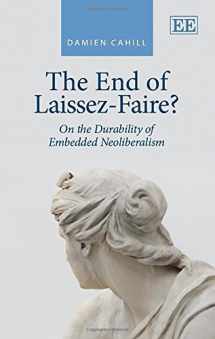
The End of Laissez-Faire?: On the Durability of Embedded Neoliberalism
Book details
Summary
Description
'Despite the global financial crisis in 2007-2008, neoliberalism has remained dominant and even informs the responses to the crisis. In his masterful analysis, Damien Cahill demonstrates that this resilience is due to neoliberalism being firmly embedded within wider class relations, institutions and ideological norms. And yet, as Cahill also argues, progressive change is possible provided it is based on large-scale political mobilisation. I most strongly recommend this book for reading.'
- Andreas Bieler, Nottingham University, UK
'Damien Cahill has emerged as one of the most penetrating social scientists on the politics of neoliberalism in the advanced capitalist societies. In his new book, he brings his many years of pouring over policy documents to examine neoliberalism in the new 'age of austerity'. The result is an impressive survey of the history and debates about neoliberal policies. But more powerful is Cahill's hard-headed analysis of why neoliberalism may not simply be in decline, despite the great social disasters it has produced: the 'Great Recession' of 2008 only being the most spectacular. Cahill insists on what many are only beginning to realize: that a new progressive political economy will not emerge as a result of the 'failure of neoliberal ideas', but only when an alternative vision of society fuses with new organized forms of social resistance.'
- Greg Albo, York University, Toronto, Canada
When the global financial crisis hit in 2007, many commentators thought it heralded the end of neoliberalism. Several years later, neoliberalism continues to dominate policy making. This book sets out why such commentators got it so wrong, and why neoliberalism remains so durable in the face of crisis.
This book is the first comprehensive critique of the dominant 'ideas-centered' approach to understanding neoliberalism. It offers an alternative view of neoliberalism as a policy regime that is embedded in institutions, class relations and ideological norms. Damien Cahill argues that the socially embedded nature of neoliberalism explains why policy makers continue to use neoliberal policies as forms of crisis response, even though the crisis itself resulted from several decades of neoliberal restructuring. It takes aim at dominant interpretations of neoliberalism, arguing that it is wrongly viewed as reflecting neoliberal free market ideals, or as resulting from the influence of fundamentalist neoliberal intellectuals. The book concludes with a prognosis of the future prospects for neoliberalism.
The End of Laissez-Faire? is a compelling and insightful analysis of neoliberalism, which will appeal to scholars and students of public policy, political science, sociology, political economy, anthropology, human geography, industrial relations and economics-related studies.
Contents: Introduction 1. The Idealist View of Neoliberalism 2. Actually Existing Neoliberalism 3. Did Neoliberal Ideas Create the Neoliberal State and Economy? 4. Always Embedded Neoliberalism 5. The Class Embedded Nature of Neoliberalism 6. Institutionally Embedded Neoliberalism 7. Ideologically Embedded Neoliberalism 8. The Global Financial Crisis and the Future of Embedded Neoliberalism Bibliography Index


We would LOVE it if you could help us and other readers by reviewing the book
Book review



